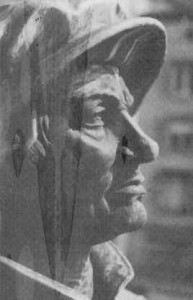1484 — 1531
The most accomplished musician of the Reformation era, he trashed the grand organ in Zurich’s cathedral when he discovered that the music there was nothing more than “high-brow” entertainment devoid of gospel-significance. Superbly educated in Renaissance humanism (including the glories of fine art), he directed the demolition of priceless icons as soon as he saw that they were superstitiously venerated as magic. Sickened at the slaughter of Swiss youth in foreign wars, he helped mobilize military forces in defense of his native land and perished in battle himself.
Zwingli was born on New Year’s Day, 1484, seven weeks after Luther. University studies at Berne and Basel equipped him with the “new learning” then capturing younger scholars throughout Europe. When Erasmus, a gifted linguist, sifted and sorted and finally assembled several manuscript-fragments to form a usable Greek testament (without which there would have been no Reformation), Zwingli hand-copied Erasmus’s entire Greek text and memorized all of Paul’s epistles.
Luther had come to gospel-conviction when tormented by his conscience: “How can an unrighteous sinner get right with the all-holy God?” Zwingli, on the other hand, came to the core of scripture when distressed not at himself but at the plight of his people, defenceless as they were on all life’s fronts. Ordained to the priesthood in 1506, he was sent as assistant to a church in the province of Glarus, where he continued his humanist studies and produced his first book, a biblical critique of the social distresses prevalent in Switzerland.
The year 1513 found him accompanying Swiss soldiers-for-hire to Italy. Sickened at the carnage of Switzerland’s most able-bodied, and appalled at the greed, coarseness and cruelty fostered in young men who pillaged civilians remorselessly, Zwingli determined that the iniquitous practice of mercenaries would end. He remained undeterred despite opponents who protested that the mountainous regions of Switzerland had to export soldiers in order to acquire the money needed to purchase grain and avert starvation.
Now Zingli’s preaching took on a decided gospel-flavour as Luther’s influence seeped into him. Soon his bishop transferred him to Zurich, the city where he would remain for the rest of his life and to which his name would be fixed as surely as Luther’s was to Wittenberg and Calvin’s to Geneva. As there grew in Zwingli the conviction that scripture is the normative witness to Jesus Christ and the primary source of Christian understanding and discipleship, he put aside the mediaeval practice of delivering snippet-sermons from a few prescribed texts (the lectionary) and instead preached straight through the New Testament — in the course of seven years!
His preaching bore much fruit. One aspect of it was the gospel-freedom that led several parishioners to reject Rome’s prohibition of meat during Lent. These people embodied their convictions by eating sausages immediately prior to Easter. Zwingli’s bishop, formerly a supporter, now denounced him. Zwingli in turn petitioned a nation-wide church conference to authorize unimpeded preaching of the gospel together with all the implications of the gospel — chief among which now wasn’t sausages but clergy marriages. When the conference dawdled over the last point Zwingli sought to move it along by reminding delegates of what they could expect if the clergy weren’t allowed to marry: another 1500 children born to “celibate” priests in one year in one province of Switzerland! (Frustrated at the conference’s slowness, Zwingli secretly married Anna Reinhart, a widow with three children. Subsequently Anna and Ulrich had another four. They were publicly “married” several years later.) The city council, long nurtured by the ferment of reform effervescing everywhere in Europe, officially declared Zurich to be Protestant. In yet another of his political victories at this time the city council decreed that none of its citizens could be mercenaries under any flag.
A huge controversy exploded over the nature of Christ’s presence in the Lord’s Supper. Summoned to the castle in Marburg (1529) Luther and Zwingli squared off in a formidable debate that settled nothing. Luther foamed, “Before I drink mere wine with the Swiss I shall drink blood with the pope.” Little did he know that Zwingli never advocated “mere wine”. Luther feared having the living person of Jesus Christ disappear from the Lord’s Supper. Zwingli feared the superstition of suggesting that Christ’s people bite their Lord and chew on him during the communion service. Luther accused Zwingli of an empty celebration. Zwingli accused Luther of cannibalism. They simply talked past each other. In addition, Luther failed utterly to appreciate the ecclesial dimension of Zwingli’s eucharistic understanding: the Lord’s Supper bespeaks not only the presence and power of Jesus Christ but also the transformed fellowship of believers, a fellowship characterized by love, mutual concern and service.
When Emperor Charles V, supported by Austrian troops, threatened Protestant Switzerland, Zwingli rescinded his condemnation of war and insisted that the citizens of Zurich be protected. He helped organize the defensive forces, even accompanying them into the conflict. Wounded terribly at the battle of Capel, an enemy soldier recognized him as Zurich’s leader and leapt to impale him with a sword-thrust.
The 47-year old had spent his life on behalf of the people he loved, much more involved politically than the other Reformers. No aspect of the city’s communal life had escaped him. He worked as tirelessly to procure foodstuffs as he did to have divorces granted on the grounds of wife-beating, desertion, mental cruelty and sheer incompatibility.
His love for his people shone most brightly when plague overtook the city and he spent himself self-forgetfully on behalf of the sick and the dying, only to be plague-infested himself. When he had survived the pestilence he wrote his “plague-hymn”, with its first stanza,
Help me, O Lord,
My strength and rock;
Lo, at the door
I hear death’s knock.
When death knocked at his door in 1531 his memorable watchword was still on his lips: “Not to fear is the armour!”
Victor A. Shepherd
November 1995
